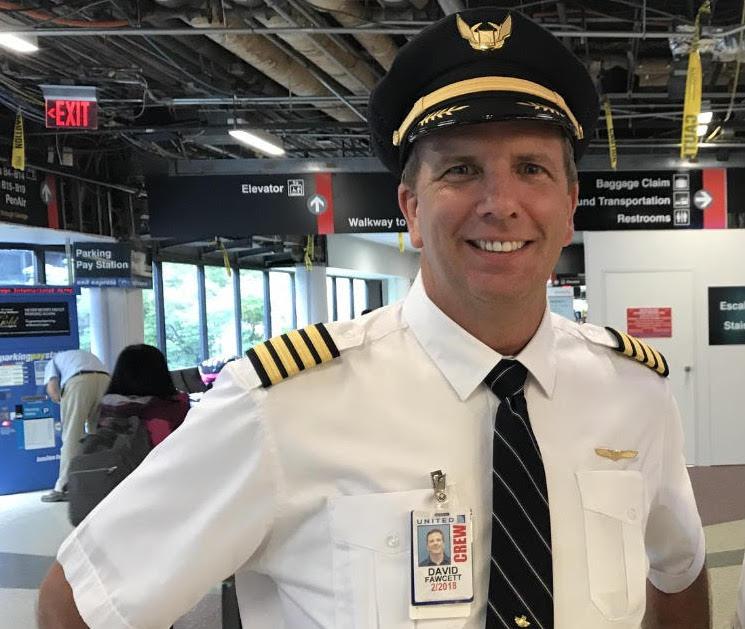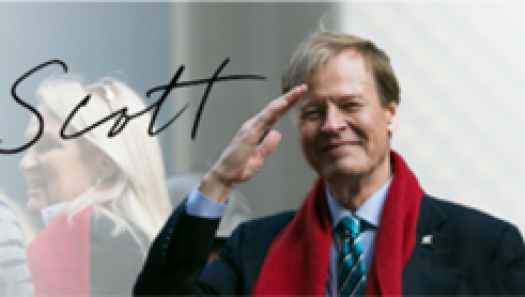Military & Veterans Life
United Airlines Captain David Fawcett Remembers 9/11 and Flight 93
WeSalute (founded as Veterans Advantage)

This past Monday was the 16th anniversary of the tragic terrorist attacks that shook our nation on September 11th, 2001. Veterans Advantage posted a Facebook update on the 11th in remembrance of the Americans that lost their lives that day, thanking the firefighters and police who courageously responded, as well as those servicemembers who have continued to fight to defend our freedoms each and every day since.
We also asked our followers to tell us where they were when they learned that the United States was under attack. Your comments echoed our own feelings and thoughts - it seems like it was just yesterday. It is hard to believe that those enlisting in the military today would have been only 2 years old when the Twin Towers fell and the War on Terror began.
One comment on our post struck a major chord. United Airlines Captain David Fawcett, a retired Major who served as a Pilot and Aircraft Commander in the Air National Guard for 20 years, and who has been a Pilot for United for 19 years, wrote to tell us his amazing, heart-chilling story. Afterward, we called him for a full interview.
“It’s amazing how much you do remember, even after so much time has passed,” David told us. “I was based in New York, and the flight crews that we lost that day were all New York crews that had flown those routes multiple times. They were my co-workers.”
“I was the First Officer on United 1526 that day, flying from LaGuardia to Denver,” David continued. “We took off 9 minutes before the first airplane hit the North Tower of the World Trade Center. We were changed over to Cleveland Center Air Traffic Control (ATC), and there was a lot of confusion as ATC began issuing holding instructions for aircraft inbound to the New York area airports. We were joking that it must be the weather because, ironically, it was a clear, sunny day on 9/11.”
David couldn’t have guessed that they had been transferred to Cleveland’s Air Traffic Control because there was a major crisis at hand. David said they began receiving confusing, almost cryptic messages from their dispatcher. Reports of hijacked aircraft had been received, but no one in the air knew yet what the hijackers had planned.
“We received a note from dispatchers telling us that a plane had hit the Trade Tower,” David told us. “United 93, which was right behind us, was heading westbound like we were. ATC was trying to contact them [United 93]. There had been commotion on the radio frequency already and it was really strange. Air Traffic Control asked if we could get in touch with them, so I tried calling United 93 several times on the radio, but we couldn’t get ahold of them. There was no reply. It was right about then that we heard the terrorists broadcast live on the frequency saying they had hijacked the plane and had a bomb onboard. They had accidentally pressed the wrong button in the cockpit and thought they were addressing the passengers on the PA system. ATC said, “Calling Center, say again?” A Delta Airlines pilot chimed in: “We heard bomb on board,” and I said the same thing. ATC replied “Yes, that’s what we thought. We believe its United 93 and we think are hijacked.”
David explained to us that this is a common problem. The buttons are very close to each other in the cockpit, and it’s easy to push the wrong one. Especially if you aren’t familiar with the controls.
“As part of our instrumentation, we can see other aircraft around us simply as colored shapes on our navigation displays. We noticed the aircraft behind us doing an aggressive climb. We figured out it was United 93. It was then that ATC started getting airplanes out of the way. We were in front and were turned to the south and Delta, directly behind United 93, was turned to the north. We then noticed the distance between us was increasing rapidly and figured out United 93 had turned around at that point” David recalled.
He would find out later that the crew and passengers of Flight 93 had learned of the fate of those aboard Flights 11 and 175, and had fought back against the hijackers, stopping the plane from reaching its intended destination. While it is not known for sure where the terrorists planned to crash the plane, it is thought that they would have targeted the White House.
“Cleveland Tower got a bomb threat as we were approaching Chicago to land. I had to revert back to my primary flight days and land completely blind, without communications with Air Traffic Control,” David remembered. “Just as we were touching down the tower came back on, but as we cleared it was chaos at O’Hare. Planes were landing everywhere, and every passenger on board knew someone at the world trade center and was worried if they were ok. The Airport Authority was sending vehicles out that would stop in front of the planes that had landed. They would stand out in front of the cockpit and give a thumbs up tight against their chest, where only the pilot could see them. If you gave a thumbs up it meant you weren’t hijacked.”
“ATC then made an announcement saying they were clearing the skies and that all aircraft should call back when they had a divert airport,” David remembered. “We headed to Chicago and as we were about to start our approach to land, ATC informed us they couldn’t get a response from Chicago. They had evacuated the tower because of a bomb threat. I had to revert back to my primary flight days, making radio calls in the blind to make sure no other planes were around and landing at the busiest airport in the world without permission or talking to anyone. It was beyond surreal! Just as we were touching down, the tower came back on. It was chaos at O’Hare. Planes were parked everywhere, and as we taxied and then parked at some random spot on the airport, it began to sink in what was happening. We knew every passenger on board our airplane probably knew someone at the world trade center and was worried if they were ok. We then watched as The Airport Authority sent a vehicle out to each airplane and would stop under the front left of the airplane. The driver gave a thumbs up tight against his chest, where only the Captain could see him. We figured out that if the Captain on each airplane didn’t give a thumbs-up, they were also hijacked.”
When we asked David what he thought the pilots of those hijacked planes must have been thinking, and how they would have reacted, he told us that all airline pilots were trained to handle hijackings.
“I knew Vic [Saracini, the pilot of United Flight 175] and had flown with him the month prior,” David said. “We had procedures in place for how to handle a hijacking situation, but 9/11 was a game changer. Every hijacking that had ever happened until that point was somebody who wanted to go somewhere. You knew you were going to land somewhere and keep following procedures. It could’ve have been anybody flying those planes that day. It’s tough to dwell on that aspect of it, but you definitely think about it.”
David Fawcett, who has been a member of Veterans Advantage since 2013, flew combat missions in Bosnia, Iraq, Kuwait, Afghanistan, and Uzbekistan. He was a Pilot and Aircraft Commander on C-130 aircraft for the Rhode Island Air National Guard and was also previously enlisted for 7 years as an Aircraft Armament Systems Specialist “bomb loader” for the Arizona Air National Guard and Florida Air National Guard.
He follows in the shoes of his father, Rex, who served in the Connecticut Air National Guard and had an accomplished career as a pilot for United Airlines for 37 years.
We ended our interview by asking David what advice he has for those who are thinking of joining the military but are too young to remember the terrorist attacks of September 11, 2001.
“Of course, they can watch videos of what happened online, but they should also take the time to talk to somebody who was serving during that period so they can really appreciate what they went through and their commitment to serving our country," David said. “I think it would make their career more successful because they’d have a better sense of why we do this; of what we are protecting.”
We extend our deepest thanks to David for allowing us to interview him, and for his military service. We hope that his story will give our younger readers more perspective on these tragic historic events. We will never forget.
Do you or your loved one serve your country, either through military service or community service with military, vets, and their families? We would love to hear your story and share it with our audience on our blog, The Service, or through our Community Awards.


